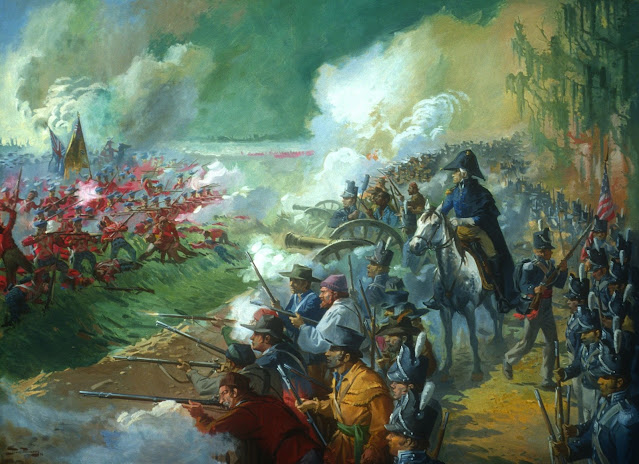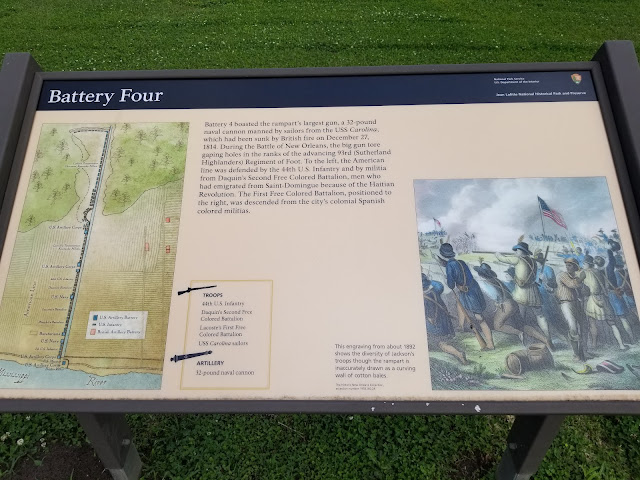In 1814 we took a little trip
Along with Colonel Jackson down the mighty Mississip
We took a little bacon and we took a little beans
And we caught the bloody British in the town of New Orleans
We fired our guns and the British kept a-comin'
There wasn't nigh as many as there was a while ago
We fired once more and they began to runnin'
On down the Mississippi to the Gulf of Mexico
These are the opening lines and chorus for Johnny Horton's big crossover hit "The Battle Of New Orleans which became popular in 1959 when I was nine years old. It has always been one of my favorite songs and every time I hear it I am filled with pride as a Tennessean and as an American. Although many on the left would condemn the song as xenophobic, I think it captures the traditional spirit of American exceptionalism that I believe in. Jackson was a very flawed man but like him or not he had a huge impact on the history and direction of this country. Between Jackson and his protege James K. Polk, a fellow Tennessean, they added more territory to the United States than any other Americans. Jackson was responsible for adding Alabama, Mississippi and Florida to our modern day map. Polk was responsible for adding all, or part of at least eleven states to the Union. New Mexico, Arizona, California, Nevada, Utah, Texas, Kansas, Colorado, Oklahoma, Oregon and Washington. It can be argued that Texas was already secured territory because of Sam Houston's victory at San Jacinto. One of Mexico's goals was to win back the territory that they had lost in the War for Independence. This would be a big factor in bringing America and Mexico to blows in the Mexican-American war of 1846. Mexico agreed to relinquish all claim to Texas in the treaty of Guadalupe Hidalgo, and the American Southwest ending the Mexican- American War.
The same kind of argument can be made about Jackson's victory at New Orleans. The Louisiana territory was a vast region that makes up of all or part of the states of Louisiana, Arkansas, Oklahoma, Kansas, Missouri, Colorado, Iowa, Nebraska, Wyoming, Minnesota, South Dakota, North Dakota, and Montana. France originally gained sovereignty over this area in 1699 and ceded it to Spain in 1762. In 1800 France, under Napoleon, regained ownership of the Louisiana Territory. It was his hope to reestablish a French presence in North America. Napoleon, however; was unable to put down a revolt in Saint-Domingue and he was at war with England. Because Napoleon needed money for the war effort he gave Thomas Jefferson an offer that he couldn't refuse. America bought this vast area for the bargain basement price of 15 million dollars. America declared war on Britain in 1812. By the closing months of 1814 Britain was able to divert it's best troops to fight in North America.
A plan was developed to attack New Orleans and take back the real estate purchased by Thomas Jefferson. This was partly because Spain did not recognize any agreements made with Napoleon and Spain was allied with England. British military communications verify that England intended to keep the Louisiana territory which would halt the westward expansion of the U.S. In early 1814 Napoleon abdicated his power and was sent in exile to the Island of Elba. This freed up some of Britain's best troops to be sent to America for a final push to win the war. The British met with some success, capturing and burning Washington D.C. in the process. The British had been trying since September 1814 to capture New Orleans.
Jackson assembled a motley crew of U.S. Army troops, Kentucky, Tennessee, and Louisiana militia. Choctaw warriors, free men of color, and pirates to fight against the best troops that England had under the command of Sir Edward Pakenham who was the Duke Of Wellington's brother-in-law. In the ensuing battle the American forces numbered around 4,000 and the British forces numbered 8,000. A combination of good generalship on the part of Jackson, topography that did not favor the British, bad tactical decisions on the part of the British leadership and sheer luck combined to produce one of the greatest victories in American history. The Americans suffered 71 casualties as opposed to over 2,000 British casualties. General Pakenham and his 2nd in command were killed. Overall the American's were very lucky that we weren't defeated by the British in the War of 1812, which was one of our most avoidable wars in history. The devastating end for the British at New Orleans won us grudging respect that had been lacking prior to the war from England and other countries. Some historians call it our second War of Independence.
Although there was some close calls up until the Civil War, we would never go to war against the British again. Because of our alliances with them in WW1 and our crucial support during WW2 America and Britain are solid partners today both militarily and economically. The Treaty of Ghent, that ended the war was signed on December 24, 1814, about three weeks before the battle. Because of slow communication the British and American's weren't aware of the treaty. The treaty was not officially signed in this country until February 16, 1815. This victory would make Jackson the greatest hero since Washington and help propel Jackson into the White House in 1828. In March of 2021, like Jackson, we took a little trip down to the town of New Orleans. I was able to scratch off one of the things that I have always wanted to do off of my bucket list. That is to see where Jackson had the final say in the War of 1812.
 |
| Diorama of the battle in the visitors center |
 |
| British uniform |
 |
| American uniform |
 |
| Muskets of the period |
 |
| Battle monument |
 |
| View from the British position looking toward the American lines |
 |
| View from the British position looking toward the American lines |
 |
| The American lines |
 |
| The American lines |
 |
| Russell Qualls |
 |
| Russell Qualls |
 |
| American battery position |
 |
| American lines |
 |
| American lines |
 |
| American lines |
 |
| American lines |
 |
| Russell Qualls learning about muskets |






























Comments
Post a Comment